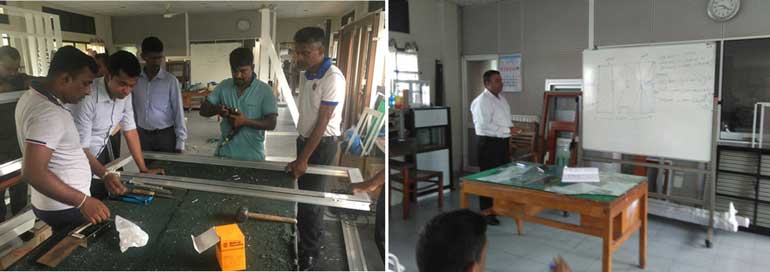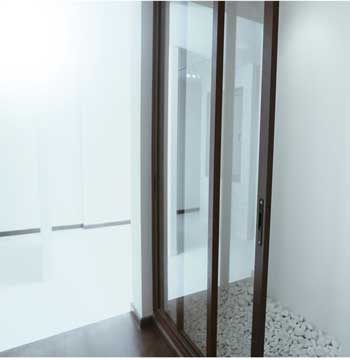Tuesday Feb 24, 2026
Tuesday Feb 24, 2026
Saturday, 6 January 2018 00:00 - - {{hitsCtrl.values.hits}}

Even as Sri Lanka’s construction sector continues to enjoy an unprecedented level of growth and development – rising to a rate of 9.3% Year-on-Year in the second quarter of 2017, the construction industry itself is finding it increasingly difficult to find labour – skilled or unskilled – to meet the rapidly increasing demand for high quality residential and commercial space.
This growth is a result of the Government’s efforts to position Sri Lanka as a commercial hub in the South Asian region. In Colombo and its suburbs, city skylines are rapidly evolving as older buildings give way to modern towers, built to international standards, utilising the highest quality material.
Parallel to the rapid development of Sri Lanka’s urban centres, the country also continues to undergo shifts in the composition of its economy. While agriculture has long been the only possible source of livelihood in rural Sri Lanka, younger demographics are increasingly turning away from agricultural vocations and moving to country’s urban centres, seeking their fortune in other sectors of the economy.
Among the sectors which have the lowest barriers to entry for these Sri Lankans is the construction sector, and the transportation sector. Especially among younger Sri Lankans, the idea of simply driving a three-wheeler or lorry to earn a living is quite appealing when compared to work in the construction sector; however the possibilities for upward mobility are much weaker in the transport sector.
Conversely, the growing shortage of labour in the construction sector has led to remarkable opportunities for growth, skills development, and the possibility of exponential income growth for those willing to put in the work.
For its part, the Sri Lankan Government has recognised the urgent need to meet the country’s rising demand for skilled professionals in the construction sector with efforts already underway to introduce subjects like Construction studies, and Aluminium Fabrication Studies as ‘applied curriculum subjects’ for Advanced Level students from 2019 onwards.
However leaders in the private sector have also long been cognisant of the need for up-skilling both the country’s existing and future labour pool. Having first established its Aluminium Fabrication training programme in 1998 Alumex – Sri Lanka’s pioneering extruder and manufacturer of aluminium profiles – has provided extensive practical training to over 15,000 fabricators free of charge. According to Alumex Managing Director Rohan Peris, this initiative was first established in order to ensure that the products which Alumex manufactured would be fabricated and installed correctly, in order to ensure that the company’s reputation for producing Sri Lanka’s highest quality aluminium products would not be tarnished.
“Our reputation for excellence is something we take very seriously and with Aluminium products, you have to be very careful in how they are fabricated. It takes great precision and attention to detail, hence very early on, it was decided that we needed to work with fabricators, and really anyone who was using our products. We had to support them, and educate them on how to get the most out of our products.”
“However, soon after we started this project, it became increasingly clear to us that this initiative was much bigger than just our company. The impact that this training was having on people’s lives, was truly remarkable, and we take great inspiration from the many success stories that Alumex’s training programs has helped to create over the past 19 years,” Peris explained.
One of the programme’s greatest success stories is Nalin Narampanawa Managing Director of Nova Creations. A participant who joined the programme near its inception, Nalin shared his remarkable journey from his home village near Anuradhapura which he left with just a few thousand rupees to start training with Alumex.
“I made the decision to come to Colombo after I was commissioned with the task of fabricating an aluminium window at our village school. At the time, I was involved in making photo frames using aluminium profiles, and very basic work like that.
“The principal told me he had a job for me and while I didn’t have much experience, I decided to take it up as a challenge. But I quickly realised that it was much more complicated than I had imagined,” Narampanawa explained.
Given the material’s durability and versatility, he realised that aluminium fabrication would be a skill that would only grow in demand, and therefore sought out help to develop his own expertise in the subject. “I asked a lot of people who had already started fabricating aluminium but either they didn’t know much more than I did, or they were reluctant to share what they had learned so eventually I made a decision to come to Colombo with Rs. 13,000 which was all that I had saved at the time.
“After making the journey and starting classes, I only had Rs. 3,000 left, so I was living from day-to-day and I would walk a long distance to even attend the training programs. But it was worth it for the skills that I learned,” he reminisced.
Today, Nalin is a successful entrepreneur in his own right, managing his own workshop that employs 30 youths from across the island, including his home district of Anuradhapura. Commenting on the position of the industry today, Nalin notes that the industry continues to suffer a lack of trained fabricators despite offering a starting salary of between Rs.40, 000 and 50,000 per month. According to Nalin, apart from providing the necessary training, Alumex also supports fabricators by offering them extensive technical assistance in relation to any projects they undertake by providing feedback, recommendations and liaising with clients on behalf of the fabricators free of charge; support which he stated had been fundamental to his success.
Over the years, Alumex has also worked to ensure that its training programmes are as accessible as possible in order to replicate the kind of success that people like Nalin have enjoyed; a feature which has attracted an exceptionally wide cross section of people to the program.
Exemplifying this diversity is Roshini Samaranayaka Managing Director of Wijetunga Constructions. Having qualified as a civil engineer at the University of Moratuwa, Roshini noted that despite her extensive academic training, Alumex’s program had given her a strong advantage in her industry thanks to the hands on experience in sophisticated aluminium fabrication techniques it provided; techniques which have helped her to rapidly build up her own, highly successful construction firm, that makes extensive use of the latest, and most sophisticated aluminium profiles being produced by Alumex.
 “It is a common misconception that aluminium fabrication is a ‘man’s job’ – there’s no such thing. I had a female fabricator who worked under me, received the training and started a workshop of her own. All it takes is passion, practise and precision and anyone who works at this job can earn well.”
“It is a common misconception that aluminium fabrication is a ‘man’s job’ – there’s no such thing. I had a female fabricator who worked under me, received the training and started a workshop of her own. All it takes is passion, practise and precision and anyone who works at this job can earn well.”
In particular, Roshini highlighted how Alumex’s comprehensive training had proven invaluable in helping her to select the best profiles for each job, while the technical training gave her the know-how necessary as a fabricator to speak to clients with confidence.
“Alumex has always been an extremely supportive partner to our company and the industry as a whole. Often, they are the first to make the latest equipment available in the local market at an affordable price, while the training itself is completely free so we are able to send any of our fabricators – whether they have experience or are learning for the first time; and whether they are a man or a woman – to develop their skills in a way that they can easily apply to our work.”
Demand for buildings that are furnished and fitted with aluminium is also on the rise, given the material’s remarkable versatility and durability. These dynamics have made aluminium fabrication an increasingly vital part of Stylish Windows Lanka Ltd.’s business.
Established in 2012, the company has grown to be one of Alumex’s most sought-after firms for aluminium fabrication. Stylish Windows Managing Director, L.C. Lakshman Perera notes that it was the invaluable training and unwavering support of Alumex that enabled their continuing success.
“Since receiving the training from Alumex, I have taken on major projects like Pegasus Reef Hotel, Anantara Hotel in Chilaw and Weligama Bay Marriott and completed them successfully. The training has been a key turning point in my life as it helped me to unlearn whatever I learned from being a helper for years and learn everything properly, once and for all” “Not only has Alumex given us a good training, it also keeps us constantly updated on new technology, designs to make sure that we’re thorough and conversant with the global trends,” Perera said. Given the immense positive impact which Alumex’s training programmes have enabled, the company remains committed to maintaining this service free-of-charge moving forward, a fact which continues to empower those entering the industry, like S. Jegatheesan, Managing Director of Vishwakarma Aluminium Fabricators who recently completed another round of training with Alumex.
Currently working out of a relative’s property Jegatheesan hails from Jaffna and travelled to Colombo to start working in the construction sector as helper, before eventually commencing his training with Alumex.
“Not just during the training but also after we completed the course, all of our instructors have been very accessible and helpful to us. Even now if we have a question, we can speak to them and get answers on anything to do with aluminium fabrication. Today I have four youth – including two from Jaffna and from Ratnapura – working with me and I have recommended the course to them as well.
“Once they are also trained we will be able to take on larger projects and in this way I am confident that I will be able to expand our business and get our own space to build a workshop in the near future.”